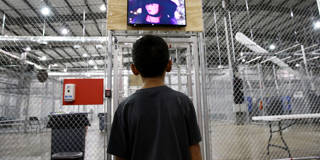Political leaders who want to act humanely towards asylum-seekers and other migrants now face a moral dilemma. Either they pursue border control that is strict enough to undercut public support for far-right parties, or they risk allowing those parties to gain more power – and challenge the West's most fundamental values.
PRINCETON – The most heart-rending media story of the past month featured children crying after being separated from their parents at the border between the United States and Mexico. US President Donald Trump, after initially defending the separations, yielded to public pressure and signed an executive order ending it. In Europe, too, immigrants made headlines as the ship Aquarius, carrying 629 rescued would-be immigrants, was turned away by Italy’s new populist government, as well as by Malta. That formed the background to a European Union meeting in Brussels, which hammered out a compromise on how to protect Europe’s borders and screen arriving migrants.
Less than three years ago, when more than 100,000 asylum seekers were arriving at the EU’s borders every month, German Chancellor Angela Merkel said: “The fundamental right to asylum for the politically persecuted knows no upper limit.” She added that this applies also to “refugees who come to us from the hell of a civil war.”
Merkel followed those words with action. In 2015, Germany registered 890,000 asylum seekers, and over the 18-month period from September 1 of that year, accepted more than 600,000 applications for asylum. To integrate so many newcomers from very different cultural backgrounds was obviously going to be a difficult task, but Merkel famously proclaimed, “Wir schaffen das” (We can do it). No act by any German leader, not even Willy Brandt’s spontaneous decision in 1970 to kneel before a memorial to the heroes of the Warsaw Ghetto Uprising, has more decisively distanced Germany from its racist past.

PRINCETON – The most heart-rending media story of the past month featured children crying after being separated from their parents at the border between the United States and Mexico. US President Donald Trump, after initially defending the separations, yielded to public pressure and signed an executive order ending it. In Europe, too, immigrants made headlines as the ship Aquarius, carrying 629 rescued would-be immigrants, was turned away by Italy’s new populist government, as well as by Malta. That formed the background to a European Union meeting in Brussels, which hammered out a compromise on how to protect Europe’s borders and screen arriving migrants.
Less than three years ago, when more than 100,000 asylum seekers were arriving at the EU’s borders every month, German Chancellor Angela Merkel said: “The fundamental right to asylum for the politically persecuted knows no upper limit.” She added that this applies also to “refugees who come to us from the hell of a civil war.”
Merkel followed those words with action. In 2015, Germany registered 890,000 asylum seekers, and over the 18-month period from September 1 of that year, accepted more than 600,000 applications for asylum. To integrate so many newcomers from very different cultural backgrounds was obviously going to be a difficult task, but Merkel famously proclaimed, “Wir schaffen das” (We can do it). No act by any German leader, not even Willy Brandt’s spontaneous decision in 1970 to kneel before a memorial to the heroes of the Warsaw Ghetto Uprising, has more decisively distanced Germany from its racist past.